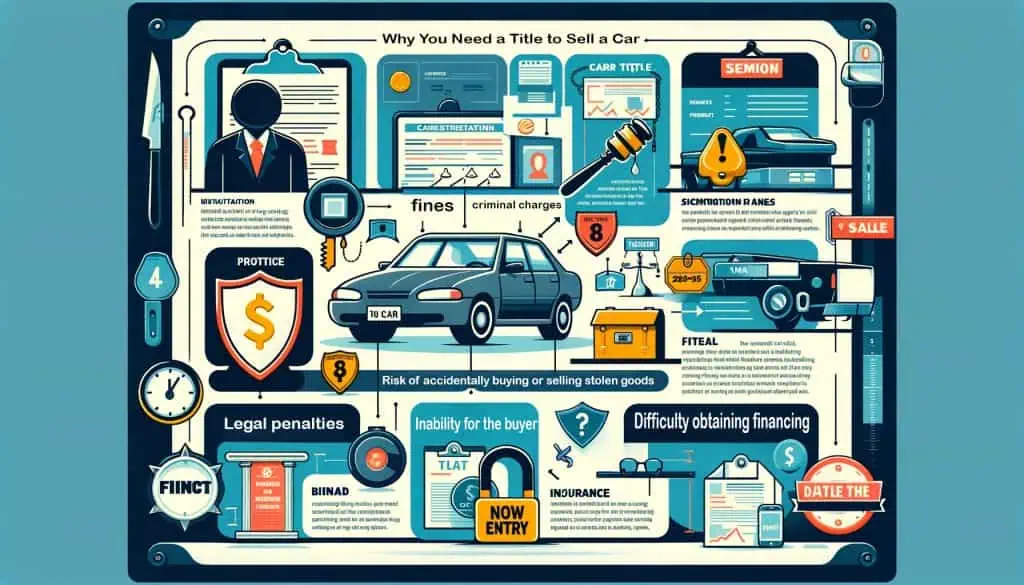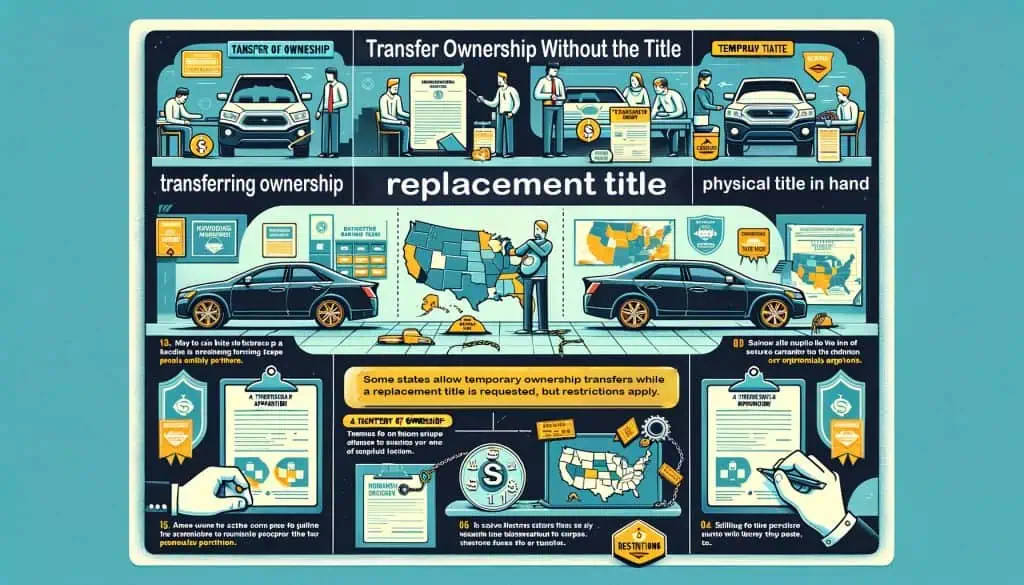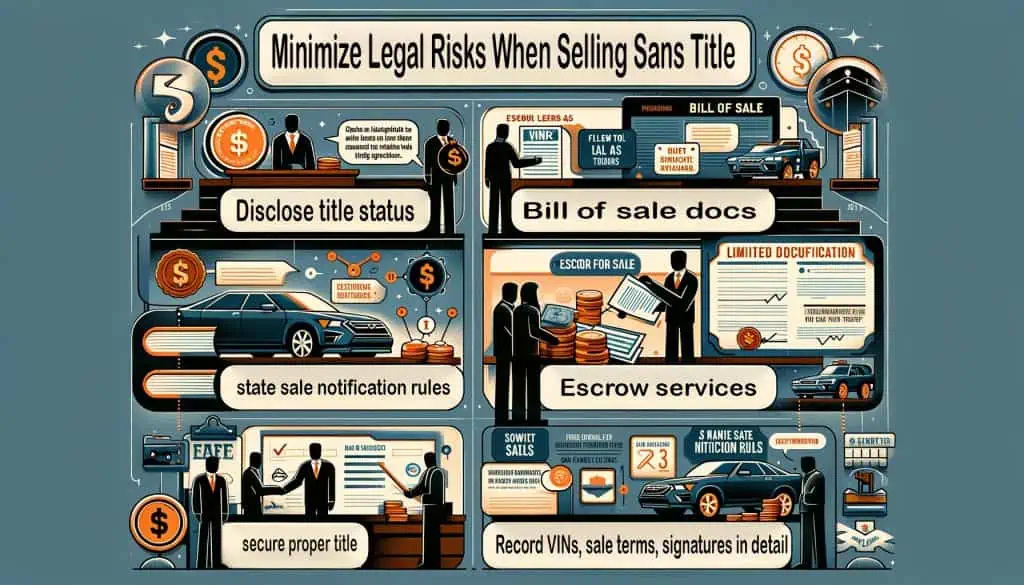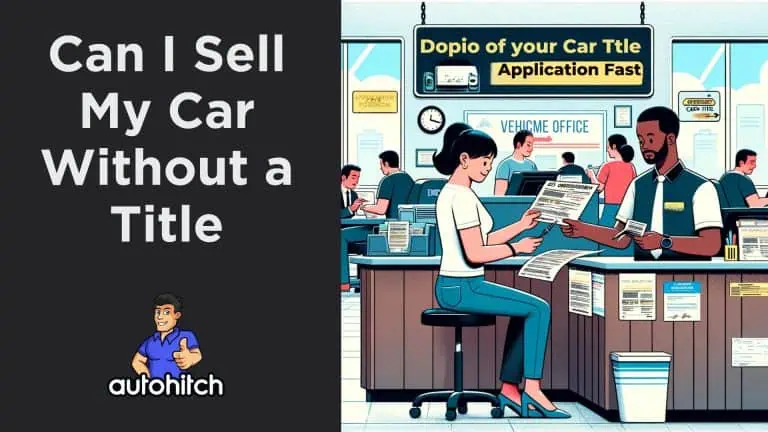If you’ve lost or misplaced your car’s title, you may be wondering if you can sell your vehicle without it.
The short answer is yes – you can sell a car with no title in most cases.
However, it does require some extra steps and paperwork on your end. Typically, you’ll need to acquire a replacement title or use alternate ownership transfer options your state provides.
Helpful Articles Related To This Topic:
- Can I Sell a Car With an Expired Registration
- How to Get a Copy of Your Car Title Fast
- Where To Get a Car Title Notarized
- How to Transfer a Car Title After Death of Owner
- How To Sell A Car Online
Table of Contents
Steps to Selling a Car Without a Title
| Step | Description |
|---|---|
| 1. Verify Title Exemption | Check if your car is exempt from requiring a title due to age or collectibility. |
| 2. Apply for Duplicate Title | If not exempt, apply for a duplicate title at the DMV, if the original is lost or damaged. |
| 3. Obtain a Bonded Title | If applicable, apply for a bonded title through the DMV as a last resort. |
| 4. Provide a Bill of Sale | Create and provide a bill of sale to document the transaction. |
| 5. Prepare Necessary Documents | Gather all pertinent documents, e.g., VIN, make, model, proof of residency, owner’s driver’s license. |
| 6. Notify the DMV of Sale | Inform the DMV of the sale to avoid future liability. |
Why You Need a Title to Sell a Car

A car title is the legal proof of ownership for a vehicle. It contains key details like the VIN, mileage, owner’s name, and more.
Titles help prevent auto theft and fraud when ownership changes hands. That’s why most states made titling mandatory and require a valid title to legally transfer a vehicle to a new owner.
Attempting to sell a car without a title or valid ownership documents can result in:
- Legal penalties like fines or criminal charges
- Inability for the buyer to register or drive the car
- Difficulty obtaining financing or insurance
- Risk of accidentally buying or selling stolen goods
Now let’s explore your options to sell without a physical title in hand…
Related Articles:
Replace the Missing Title
If you simply lost or misplaced your title, requesting a replacement from your local DMV is typically straightforward. Every state has a procedure to obtain duplicate titles.
Here’s the usual process:
- Visit your DMV website and locate the title replacement forms
- Fill out the application and submit any required documentation
- Pay the replacement title fee (usually under $25)
Once approved, your duplicate title arrives by mail in 1-2 weeks. Some states even offer rush printing if you pay an extra expedited service charge.
Key Takeaway: Applying for a replacement title through your local DMV allows you to sell your car legally in the future once the new title copy arrives.
Required Documents for Duplicate Title Application
| Document | Purpose |
|---|---|
| Vehicle Identification Number (VIN) | To identify the vehicle. |
| Vehicle Make, Model, and Year | To describe the vehicle characteristics. |
| Driver’s License | To provide seller’s identification. |
| Bill of Sale | To serve as proof of the transaction. |
| Proof of Residence | To confirm the seller’s current address. |
Transfer Ownership Without the Title

A few states permit temporarily transferring ownership without having the physical title in hand. This allows the buyer to take possession of the vehicle while they wait for a replacement title to process.
However, it still requires applying for a duplicate title initially. The buyer takes responsibility for finalizing that, rather than the seller. The seller fills out a transfer of ownership document and may need to provide other temporary permits or paperwork.
Key Takeaway: Some states allow temporary ownership transfers while a replacement title is requested, but restrictions apply.
Alternatives When a Title is Not Available
| Alternative Option | Applicability | Pros | Cons |
|---|---|---|---|
| Bonded Title | Title lost with no replacement option | Legally sell the car | Might need to provide a surety bond |
| Bill of Sale | Older or exempt vehicles | Simple document | May not be accepted in all states |
| Mechanic’s Lien | Car sold due to outstanding repair bills | Legal transfer mechanism | Process varies by state |
| Vermont Registration Trick | Vehicles older than 15 years | Out-of-state registration workaround | Not applicable to newer vehicles |
Use a Valid Bill of Sale
For older vehicles, you may not be able to obtain a traditional title document. States generally don’t issue new titles for cars and trucks over 15-25 years old. So, for these types of situations, you will need to seek alternative methods for providing ownership.
All you need is a valid bill of sale – and in some states, getting it notarized adds extra legitimacy. The bill of sale lists the VIN, sale date/price, buyer/seller information, signatures showing transfer consent, and other vehicle details a title would include.
Without this information, the buyer cannot legally register the car. Check your local laws though, as requirements for title-exempt vehicles can vary across different DMVs.
Key Takeaway: For antique, classic, or older cars that are title-exempt you can sell using a detailed, notarized bill of sale rather than a traditional title.
Apply for a Bonded Title
If you have no option to replace your lost title or prove ownership otherwise, you may be able to apply for a bonded title.
This alternative title option is a last resort but does allow you to legally sell your car in special situations.
This process issues a title after posting a surety bond, which protects the state from potential disputes over the vehicle’s ownership. If anyone makes a valid claim against your car in the future, the bond pays them compensation. Amounts vary based on your state and vehicle value.
Though bonded titles work, they can cause issues getting insurance or loans in the future. Weigh risks vs. benefits if going this route.
Key Takeaway: Bonded titles are a special title option issued when standard replacements aren’t possible, requiring a cash bond to cover potential ownership conflicts.
Notify Authorities if Vehicle is Stolen
This article focused on options for selling legitimately owned vehicles without a title. But occasionally, bad actors try to sell stolen cars using fraudulent ownership tricks and loopholes.
Related Article To Read: Do Stolen Cars Get a Salvage Title
If you discover your car was taken illegally, you should immediately report it to law enforcement rather than try selling it – even if the thief provided fake documentation.
Similarly, if you purchase a vehicle without proper title transfers, it could potentially be a stolen vehicle.
Protect yourself by only buying and selling cars using legal titling procedures.
Key Takeaway: If you find a car was stolen or are worried a purchase might be stolen, you must involve the police rather than attempt private sales without proof of legal ownership.
Minimize Legal Risks When Selling Sans Title

I realize even legitimate reasons for missing titles happen, so let’s wrap up with a few quick precautions to take when utilizing ownership transfer alternatives:
- Disclose title status/history upfront to buyers
- Record VINs, sale terms, signatures in detail
- Use escrow services carefully in private sales
- Limit liability wording in bill of sale docs
- Follow state sale notification rules
- Advise buyers on next steps to secure proper title
Taking these steps shows good faith while protecting yourself if further title disputes emerge down the road.
Potential Consequences of Selling Without a Title
A lot of people will ask if you can go to jail for selling a car without a title, and the simple answer is yes.
However, to actually get jail time, you would have to be a habitual offender and show a clear intent to defraud people rather than just being inexperienced.
Below are some examples of the potential consequences of selling a vehicle without a title:
| Consequence | Explanation |
|---|---|
| Legal Penalties | Illegal to sell without proof of ownership, may result in fines or jail time for title jumping. |
| Buyer’s Registration Issues | The buyer may face difficulty or inability registering the vehicle without a title. |
| Limited Buyer Pool | Fewer potential buyers may be willing to purchase a vehicle with no title. |
| Insurance and Loan Challenges | Challenges in obtaining insurance and loans for the vehicle without the title. |
Key Takeaway: When selling any car without a title in hand, ensure proper protections via detailed records and limiting liability to reduce legal risks.
My Closing Thoughts and Advice
Selling a vehicle without its title on hand can require some extra paperwork hassles.
But in most cases, you can take steps to demonstrate legal ownership without a physical title document available immediately.
Just explore replacement titling options, temporary transfers, or alternate ownership proofs your state’s laws allow.
And remember, disclosing details openly and recording the transaction diligently keeps all parties protected.
Sources For This Article:
- https://www.rategenius.com/buying-a-car-without-a-title/
- https://www.way.com/blog/buy-car-without-title/
- https://www.thebalancemoney.com/what-to-keep-in-mind-before-buying-a-car-with-no-title-4176095
- https://cartitles.com/the-risks-of-buying-a-car-without-a-title/
- https://www.reddit.com/r/florida/comments/qcg1gh/purchasing_car_without_title/?rdt=50027
- Car Buying Scams



